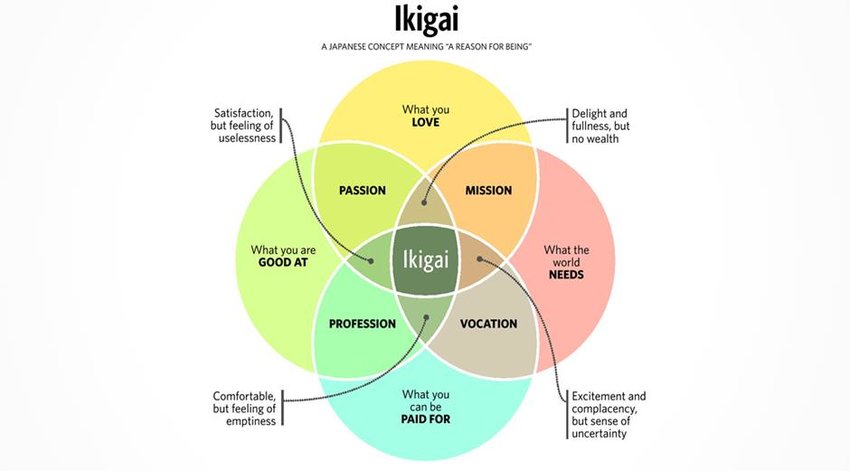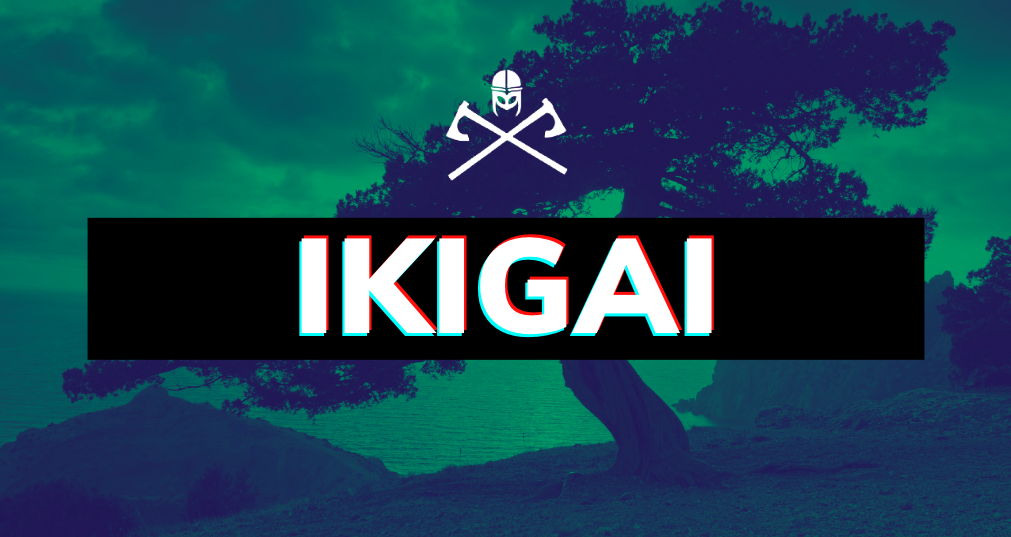Ikigai is a Japanese concept that roughly translates to “a reason for being.” It refers to finding a sense of purpose or fulfillment in life. It can be thought of as the intersection of four elements: what you are good at, what you enjoy, what the world needs, and what you can be paid for. The idea is that by identifying and pursuing your ikigai, you can lead a more fulfilling and satisfying life.
Ikigai can help you find your purpose in life by providing a framework for thinking about what you are passionate about, what you are good at, what the world needs, and what you can be paid for. By considering these four elements, you can identify potential areas of interest that align with your skills, values, and goals.
For example, if you are good at writing and enjoy researching, you might consider becoming a journalist, where you can use your writing skills to inform the public about important issues. If you are passionate about helping others and have a background in psychology, you might consider becoming a therapist, where you can use your skills to support and empower individuals.
By considering these different elements, you can start to see patterns and find potential areas of interest that align with your passions, skills, and values. From there, you can take action by learning more about these areas, volunteering or interning in them, and gaining the necessary skills and qualifications to pursue them as a career.
In summary, Ikigai helps you to focus on what is important to you, what you are good at, what the world needs and how you can make money out of it. It helps you to find a sense of purpose and fulfillment in life by aligning your passions, skills, and values with meaningful work and activities.

These four parts of Ikigai are:
- Passion (What You Love): This aspect refers to what you are truly passionate about, what brings you joy, and what you love to do. It’s the activities or interests that make you feel alive and enthusiastic. Identifying your passion is the first step in finding your Ikigai.
- Vocation (What the World Needs): Vocation relates to what the world needs or values. It’s the contribution you can make to society, your community, or the people around you. It involves using your talents, skills, and abilities to make a positive impact on others’ lives.
- Profession (What You’re Good At): This part of Ikigai focuses on your skills and expertise. It’s about recognizing what you excel at and what you can do proficiently. Your profession is often what you can turn into a career or a means of sustaining yourself.
- Mission (What You Can Be Paid For): Mission relates to what you can be paid for, as it involves finding a way to earn a living through your passions, skills, and contributions. It’s about identifying opportunities to turn your Ikigai into a source of income or financial stability.
The beauty of Ikigai lies in the synergy among these four parts:
- Passion and Vocation: When you align what you love with what the world needs, you find a sense of purpose. You’re not just pursuing your interests; you’re making a meaningful impact on others.
- Vocation and Profession: Combining what the world needs with what you’re good at leads to a fulfilling career. It allows you to apply your skills to contribute positively to society and earn a living in the process.
- Profession and Mission: Identifying what you can be paid for and what you’re good at ensures financial stability and success in your chosen field. It’s about turning your skills and expertise into a sustainable livelihood.
- Mission and Passion: When you can earn a living doing what you love, you achieve a deep sense of satisfaction. Your work becomes more than just a job; it becomes a source of joy and fulfillment.
Ultimately, the goal of Ikigai is to find the sweet spot at the intersection of these four elements, where your passion, vocation, profession, and mission converge. It’s in this harmonious balance that you discover your purpose in life, leading to a sense of contentment, satisfaction, and a fulfilling existence.
Ikigai can help you find a reason to get up every morning by providing a sense of purpose and motivation. When you have a clear understanding of your ikigai, you have a sense of direction and a reason to wake up each day. Knowing that you are working towards something that you are passionate about and that aligns with your skills, values, and goals can give you a sense of fulfillment and motivation to continue pursuing it.
Additionally, when you are doing something that you are good at, enjoy, the world needs, and can make money from, it can make you feel more engaged, excited and satisfied with your life, which can make you feel more motivated to get up in the morning and take on the day.
It’s also important to remember that finding your ikigai is a journey, not a destination. It may take time to find what truly makes you fulfilled and motivated, and your ikigai may change as you grow and evolve as a person. But by regularly reflecting on your passions, skills, values and goals, you can continue to refine and align them with the purpose of your life and find a reason to wake up every day with a sense of purpose and motivation.

